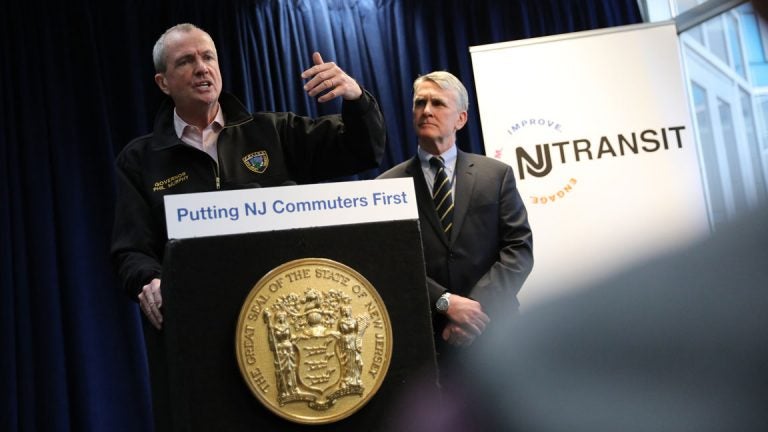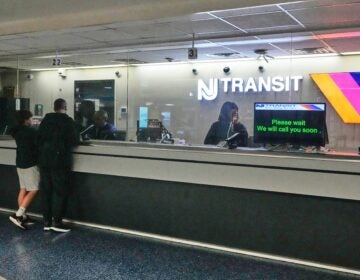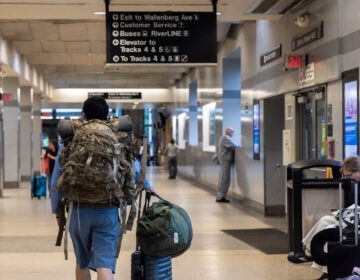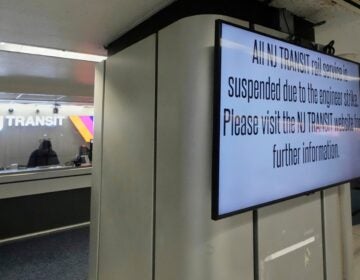One year after major audit, NJ Transit’s to-do list remains long
While the Murphy administration has addressed some of the agency’s issues, a long-term funding solution still needs to be established, among other concerns.

Gov. Phil Murphy speaks about investing in NJ Transit as Kevin Corbett, the agency’s executive director, looks on, March 19, 2019. (Edwin J. Torres/ Governor's Office)
This article originally appeared on NJ Spotlight.
—
A full year has passed since a major audit of New Jersey Transit was completed and released to the public by Gov. Phil Murphy, who once called the embattled mass-transit agency a “national disgrace.”
Administration officials say much work has been done in response to issues auditors have raised, pointing to efforts to improve communications with riders and upgrade the overall customer experience as examples.
But some of the audit’s key recommendations remain largely incomplete a year later, such as the establishment of a long-term remedy for what the auditors called an “inadequate, uncertain, and unsustainable” funding model.
Getting new agency board members in place with more “technical skills” related to its services and mission also remains a work in progress.
Murphy, a Democrat, ordered up the audit shortly after taking office early last year, and he promised it would be taken seriously and not “collect dust.” Among changes administration officials pointed to yesterday was the “customer advocate” position established earlier this year at NJ Transit. And while a dedicated source of funding has yet to materialize, they noted the agency’s operating subsidy was increased in the state budget Murphy enacted in late June, marking the second year in row that has occurred.
“Governor Murphy is committed to transforming NJ Transit into the world-class transportation agency it once was, and delivering the safe, reliable service commuters deserve,” Murphy spokesman Matthew Saidel said.
New Senate investigation
Meanwhile, state lawmakers who were hoping to see far more improvement at NJ Transit during Murphy’s tenure are getting ready to begin an in-depth investigation of their own to learn more about the agency’s continued struggles. A “select committee” of senators from both parties has been named to lead that probe, and the audit will serve as a “good place to start,” said Senate Majority Loretta Weinberg (D-Bergen) in an interview yesterday.
“I think New Jersey Transit is very much in the spotlight, as well it should be,” said Weinberg, a longtime mass-transit watchdog who will serve on the committee.
Once known as one of the nation’s top transportation agencies, NJ Transit has struggled in the wake of the Great Recession as state funding has not kept pace with increased ridership. The agency also endured a fatal train crash at Hoboken Terminal in 2016, and is still working to install a safety system known as Positive Train Control to comply with a federal mandate.
In addition, NJ Transit has faced an increasingly upset customer base as reliability has waned despite a series of fare hikes former Republican Gov. Chris Christie implemented during his tenure that have made the faltering service more expensive to use. Customers regularly lash out on social media whenever trains are running late or other problems arise, often showering blame directly on Murphy.
Can’t go on as before
Among the primary issues raised in the audit, which was compiled by North Highland, an Atlanta-based consulting firm, was NJ Transit’s lack of predictable funding from the state budget. The audit also faulted the agency for relying heavily on funds diverted from capital resources to help cover operating expenses.
“It is evident NJ Transit cannot continue to operate under its present financial model,” the audit said.
While not endorsing a specific remedy, the auditors held up as examples some of the ways that other states and metropolitan areas finance their mass-transit systems. They cited dedicated sources of revenue like sales taxes and fees levied on increasingly popular ride-hailing services like Uber and Lyft as examples of funding that go directly toward other mass-transit systems.
By contrast, NJ Transit relies heavily on funding from the state’s annual budget, including a direct operating subsidy. Murphy has more than tripled the subsidy during his tenure.
“This funding has allowed the agency to begin a rebuilding process and start to restore safety and reliability for commuters after years of mismanagement and neglect,” Saidel said.
But funding from the state budget isn’t fixed or dedicated. Instead, it is subject to annual budget negotiations with lawmakers. In fact, earlier this year Weinberg fought to boost the state subsidy to produce a larger net increase for the agency, which added an additional $50 million to the subsidy at the last minute.
Yet the annual budget process can also threaten NJ Transit funding in lean years, such as during the Great Recession when Christie was in office and was forced to make across-the-board reductions as the state faced its own significant revenue losses. (Christie also faced criticism for offsetting the cuts with diversions from other sources, including using capital dollars and revenue from the state’s clean-energy programs.)
Looking for dedicated source of funding
Murphy suggested as a candidate that NJ Transit should have a dedicated source of funding, but he has yet to put forward a plan to create one even after auditors underscored the issue. And although NJ Transit’s operating subsidy has been increased under Murphy, his administration has continued to divert significant capital dollars to support the agency’s budget, continuing a practice that was faulted in the audit.
Senate President Steve Sweeney (D-Gloucester) suggested NJ Transit’s funding concerns will be among the top issues that will be reviewed as part of the upcoming select-committee investigation, which he himself will lead.
“Part of what I’m going to be doing is looking to find a stable funding source for New Jersey Transit,” Sweeney said during a recent interview.
In addition to highlighting concerns about NJ Transit’s finances, the auditors also recommended an expansion of NJ Transit’s eight-member board. The new members, the audit went on to say, should bring “technical skills in relevant professional disciplines, regular ridership, diversity of perspectives and geography.”
Earlier this year, Murphy sent the Senate the names of several people to consider for board openings, including for new seats that were created in a law the governor enacted late last year that, among other reforms, expanded the size of the board to 13. But the positions are subject to the “advice and consent” of the Senate, which has yet to put them up for a review amid concerns about some of their relevant experience.
Weinberg said the governor’s office and Senate leadership have “not yet come to an agreement on who those board members should be.” But she added she’s hopeful their differences can be resolved before the end of the year.
Major work remains
Saidel defended the credentials of the Murphy nominees and said the governor “looks forward to working with Senate leadership and the Legislature to ensure confirmation, so (the nominees) can join in the effort to rebuilding NJ Transit into the world-class transportation agency that New Jersey commuters deserve.”
But even as those major tasks remain incomplete, NJ Transit and the Murphy administration have made other efforts in response to the auditors’ recommendations. For example, the audit called for improved communications with riders and more use of social-media platforms to get messages out about service changes or disruptions. And in recent months, NJ Transit highlighted its use of a “war room” to keep close tabs on service problems and facilitate the blasting out of updates using social media. So-called “push notifications” are also being offered to riders who use the agency’s mobile application, or app, to enhance customer communications.
Still, anyone who glances at social media would see there’s still room for improvement, Weinberg said yesterday.
Nancy Snyder, a spokeswoman for NJ Transit, said more changes are coming, including an update of the app that will feature “an improved layout and functionality for users.”
Meanwhile, in April, NJ Transit also hired the agency’s first-ever customer advocate, Stewart Mader, a former employee of Fitch Ratings, a major Wall Street credit-rating firm, who specialized in customer experience while working there. Mader’s hiring, which followed through on another of the audit’s recommendations, has allowed NJ Transit to begin assembling a customer-advisory board. He was also involved in a recent overhaul of the agency’s website, Snyder said.
Greater access to performance data
NJ Transit will also begin giving customers access to monthly performance data beginning next month in response to an executive order that Murphy signed over the summer.
The agency has also created a new tracking system for job applicants, has improved procurement flexibility, and is preparing a five-year capital plan in response to other issues raised by the auditors, among other changes, Snyder said.
Although the agency faced criticism for doing so, NJ Transit streamlined senior staff positions, and then gave raises to top executives, citing other recommendations related to staffing and agency morale that were in the audit.
And last month, NJ Transit’s board also approved a contract with another consultant, McKinsey and Co., to help implement other audit recommendations, Snyder said.
“NJ Transit will continue to use the North Highland report as a guide for prioritizing recommendations as part of this process,” she said.
WHYY is your source for fact-based, in-depth journalism and information. As a nonprofit organization, we rely on financial support from readers like you. Please give today.




